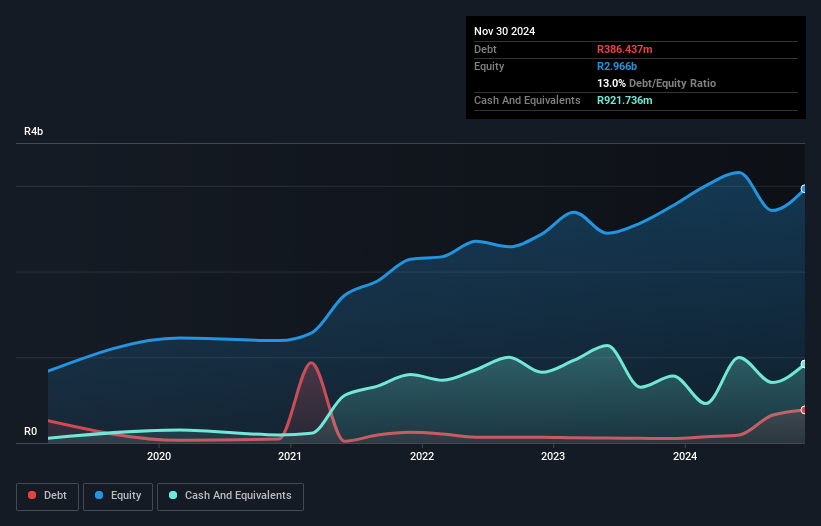
Some say volatility, rather than debt, is the best way to think about risk as an investor, but Warren Buffett famously said that 'Volatility is far from synonymous with risk.' So it might be obvious that you need to consider debt, when you think about how risky any given stock is, because too much debt can sink a company. As with many other companies Karooooo Ltd. (NASDAQ:KARO) makes use of debt. But the more important question is: how much risk is that debt creating?
When Is Debt Dangerous?
Debt is a tool to help businesses grow, but if a business is incapable of paying off its lenders, then it exists at their mercy. Part and parcel of capitalism is the process of 'creative destruction' where failed businesses are mercilessly liquidated by their bankers. While that is not too common, we often do see indebted companies permanently diluting shareholders because lenders force them to raise capital at a distressed price. Of course, debt can be an important tool in businesses, particularly capital heavy businesses. The first step when considering a company's debt levels is to consider its cash and debt together.
What Is Karooooo's Debt?
As you can see below, at the end of November 2024, Karooooo had R386.4m of debt, up from R51.6m a year ago. Click the image for more detail. But it also has R921.7m in cash to offset that, meaning it has R535.3m net cash.

How Strong Is Karooooo's Balance Sheet?
The latest balance sheet data shows that Karooooo had liabilities of R1.22b due within a year, and liabilities of R601.8m falling due after that. On the other hand, it had cash of R921.7m and R595.5m worth of receivables due within a year. So its liabilities outweigh the sum of its cash and (near-term) receivables by R303.6m.
Having regard to Karooooo's size, it seems that its liquid assets are well balanced with its total liabilities. So while it's hard to imagine that the R23.4b company is struggling for cash, we still think it's worth monitoring its balance sheet. Despite its noteworthy liabilities, Karooooo boasts net cash, so it's fair to say it does not have a heavy debt load!
View our latest analysis for Karooooo
Also positive, Karooooo grew its EBIT by 25% in the last year, and that should make it easier to pay down debt, going forward. The balance sheet is clearly the area to focus on when you are analysing debt. But it is future earnings, more than anything, that will determine Karooooo's ability to maintain a healthy balance sheet going forward. So if you're focused on the future you can check out this free report showing analyst profit forecasts.
Finally, while the tax-man may adore accounting profits, lenders only accept cold hard cash. Karooooo may have net cash on the balance sheet, but it is still interesting to look at how well the business converts its earnings before interest and tax (EBIT) to free cash flow, because that will influence both its need for, and its capacity to manage debt. Over the most recent three years, Karooooo recorded free cash flow worth 59% of its EBIT, which is around normal, given free cash flow excludes interest and tax. This free cash flow puts the company in a good position to pay down debt, when appropriate.
Summing Up
While it is always sensible to look at a company's total liabilities, it is very reassuring that Karooooo has R535.3m in net cash. And we liked the look of last year's 25% year-on-year EBIT growth. So is Karooooo's debt a risk? It doesn't seem so to us. There's no doubt that we learn most about debt from the balance sheet. However, not all investment risk resides within the balance sheet - far from it. For instance, we've identified 1 warning sign for Karooooo that you should be aware of.
If, after all that, you're more interested in a fast growing company with a rock-solid balance sheet, then check out our list of net cash growth stocks without delay.
Have feedback on this article? Concerned about the content? Get in touch with us directly. Alternatively, email editorial-team (at) simplywallst.com.
This article by Simply Wall St is general in nature. We provide commentary based on historical data and analyst forecasts only using an unbiased methodology and our articles are not intended to be financial advice. It does not constitute a recommendation to buy or sell any stock, and does not take account of your objectives, or your financial situation. We aim to bring you long-term focused analysis driven by fundamental data. Note that our analysis may not factor in the latest price-sensitive company announcements or qualitative material. Simply Wall St has no position in any stocks mentioned.